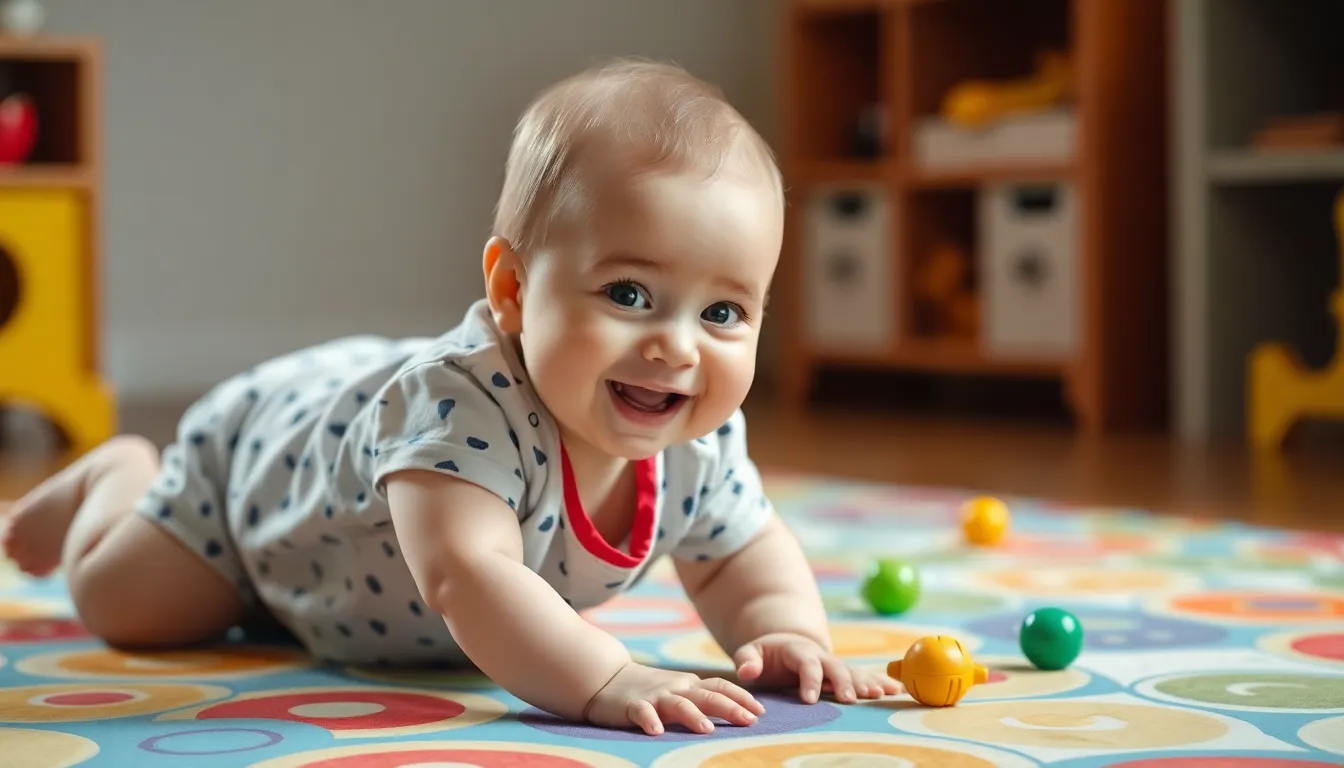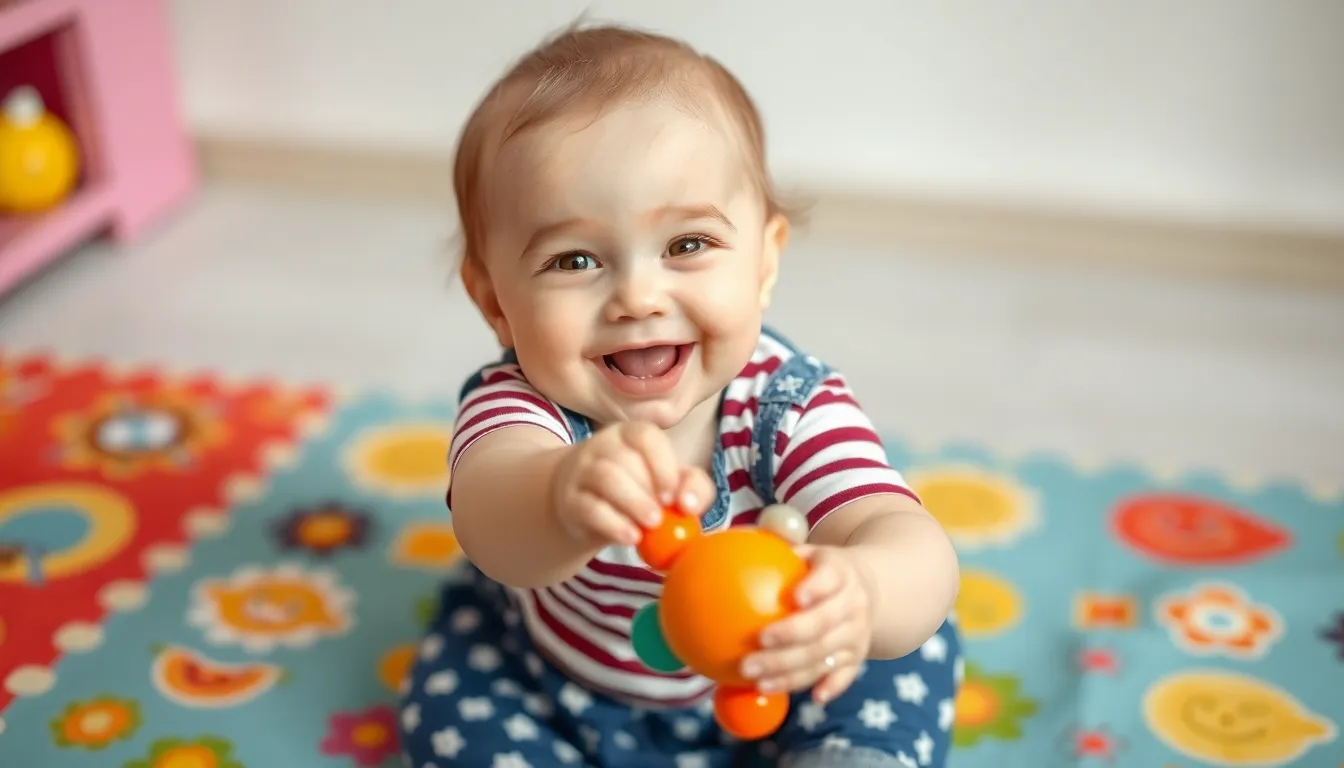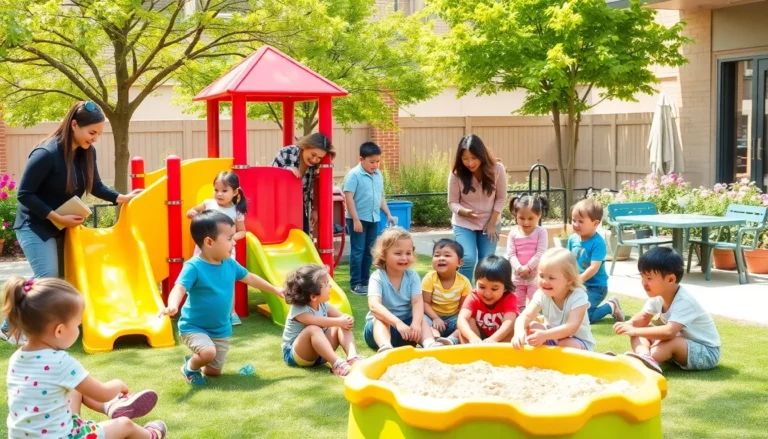Every parent knows that watching a baby grow is like being front row at the world’s cutest circus. From those first wobbly steps to the giggles that could melt any heart, baby milestones are the showstoppers that keep everyone on the edge of their seats. It’s a wild ride filled with surprises, and each achievement deserves a round of applause—preferably with a side of baby food.
Table of Contents
ToggleUnderstanding Baby Milestones
Baby milestones mark significant developmental achievements during early growth. These milestones serve as indicators of a baby’s progress and overall health.
What Are Baby Milestones?
Baby milestones refer to specific skills and abilities that infants typically acquire at certain ages. Examples include rolling over, sitting up, and taking first steps. These developmental markers are categorized into gross motor skills, fine motor skills, language development, and social-emotional milestones. A wide range of ages exists for each milestone, reflecting individual growth patterns. Parents and caregivers often monitor these milestones to track advancement.
Why Are Baby Milestones Important?
Baby milestones play a crucial role in assessing a child’s development. Tracking these achievements helps identify potential delays or challenges in growth. Early detection of developmental issues enhances the ability to implement timely interventions. Milestones foster opportunities for emotional bonding as caregivers celebrate these accomplishments. Recognizing milestones also encourages support for a child’s future learning and social interactions.
Key Physical Milestones

Tracking key physical milestones provides insight into a baby’s growth and development. Understanding these stages helps caregivers celebrate achievements effectively.
Crawling and Moving
Crawling typically begins between 6 and 10 months. Most babies initially scoot or roll before mastering the classic crawl. This movement strengthens arm and leg muscles and develops coordination. Encouragement through safe spaces promotes exploration. Babies gain confidence as they navigate their environment, fostering curiosity and independence. Recognizing when a baby shifts from stationary to crawling marks a significant developmental leap.
Walking and Running
Walking generally occurs around 12 months, although some babies may take their first steps earlier or later. First steps often involve a wobbly stance and hesitant moves. As babies progress, they gain balance and coordination, often transitioning to running between 18 and 24 months. Supportive surfaces encourage practice and build confidence. Each successful step leads to an increased willingness to explore, highlighting the relationship between physical milestones and overall development.
Cognitive Milestones
Cognitive milestones refer to the mental skills and abilities that babies develop as they grow. Recognizing these milestones is crucial in understanding a child’s growth trajectory.
Early Recognition and Learning
Developing the ability to recognize familiar faces starts around 2 to 4 months. Babies show interest in their parents’ expressions and voices, which helps them understand emotional cues. By 6 months, infants typically respond to their names, indicating improved auditory processing. At 9 months, many begin exploring objects through sight and touch, showcasing their learning preferences. Engaging with toys that produce sounds or move encourages exploration, promoting curiosity and learning. Cognitive development during these early months builds a foundation for future learning experiences.
Problem-Solving Skills
Problem-solving skills often emerge around 7 to 9 months. Infants figure out how to manipulate objects, such as reaching for a toy just out of grasp. By 12 months, many demonstrate an understanding of cause and effect through exploration, like dropping items to see them fall. Engaging in simple games, such as peek-a-boo, enhances their ability to anticipate outcomes. By 15 months, they often mimic actions and express frustration, indicating they recognize challenges. Offering varied toys encourages creative thinking and cognitive engagement.
Social and Emotional Milestones
Social and emotional milestones play a crucial role in a baby’s overall development. These milestones reflect a baby’s ability to interact and connect with others.
Bonding with Parents and Caregivers
Bonding begins at birth, with infants recognizing their parents’ voices and scents. By 2 to 3 months, babies often smile in response to familiar faces, showcasing emerging social skills. At 4 to 6 months, they express emotions such as joy and anxiety, responding to their caregivers with cooing and laughter. Engaging in meaningful eye contact during playtime strengthens emotional connections. Between 6 and 12 months, babies might reach for their caregivers in moments of distress, indicating trust and attachment. Such bonding experiences promote a secure attachment, laying the foundation for future emotional development.
Interaction with Peers
Interaction with peers typically starts around 9 months. Babies often engage in parallel play, where they play alongside each other without direct interaction. From 12 to 18 months, they begin to exchange toys and respond to each other’s actions, illustrating the onset of social awareness. By 18 to 24 months, toddlers show interest in cooperative play, often imitating friends and participating in simple games. Such interactions foster critical social skills, including sharing and empathy. Engaging in supervised playdates enhances these skills, helping children navigate social dynamics and develop friendships.
Communication Milestones
Communication milestones are essential markers in a baby’s growth, showcasing their development in language skills.
Vocalization and Babbling
Vocalization begins around 2 months when babies coo and make soft sounds. By 4 to 6 months, babbling emerges, with repetitive consonant-vowel combinations like “ba-ba” or “da-da.” At this stage, infants experiment with pitch and volume, which lays the foundation for future speech. Engaging with infants during this time supports vocal play and encourages them to imitate sounds. Parents can talk back to their babies, creating an interactive dialogue. This back-and-forth exchange cultivates communication skills and helps babies understand conversational turns.
First Words and Phrases
First words typically surface around 12 months, marking a significant leap in language development. Common first words include “mama,” “dada,” and “bye-bye.” By 15 to 18 months, infants start combining two words to form simple phrases, like “more juice” or “big truck.” This ability indicates growing comprehension of their environment and enhances social interaction. Encouraging vocabulary growth involves reading aloud and naming objects in daily life. Repetition and positive reinforcement support word retention and understanding. As infants express needs and emotions verbally, they develop confidence in their communication abilities.
Celebrating baby milestones is a joyous journey that reveals the incredible growth and development of infants. Each milestone marks a unique achievement that not only showcases a baby’s capabilities but also strengthens the bond between caregivers and their little ones. Recognizing these milestones fosters a deeper understanding of a child’s progress and encourages positive interactions.
As babies transition through various stages of development their confidence flourishes. This not only sets the stage for future learning but also nurtures essential social and emotional skills. By embracing and tracking these milestones parents can provide the support and encouragement necessary for their child’s holistic development. Cherishing these moments creates lasting memories while laying a strong foundation for the exciting adventures ahead.




